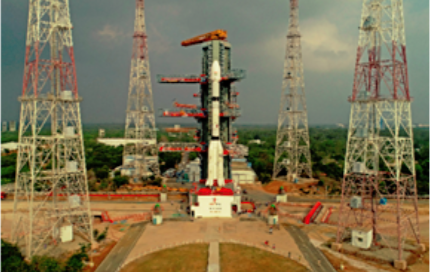
Sriharikota: The successful launch of Satellite INSAT-3DS on launch vehicle GSLV-F14, today is set to boost India’s meteorological observations and services including weather, climate, and ocean-related observations and services. It is expected to expand knowledge and better disaster mitigation and preparedness in the future.
Fully funded by the Ministry of Earth Sciences (MoES), the launch by the Indian Space Research Organisation (ISRO) took place at the Satish Dhawan Space Centre at 1730 hours.
INSAT-3DS will augment the country’s meteorological (weather, climate, and ocean-related) services with the presently operational INSAT-3D and INSAT-3DR in-orbit satellites. The newly launched INSAT-3DS satellite aims to enhance the monitoring of Earth’s surface, atmosphere, oceans, and environment, elevate capabilities in data collection and dissemination and satellite-aided search and rescue services.
The 51.7-meter (m) tall and 4 m wide Geosynchronous Satellite Launch Vehicle (GSLV)-F14 placed the INSAT-3DS satellite into a geosynchronous transfer orbit, then to a geosynchronous stationary orbit in space. INSAT-3DS is configured around ISRO’s well-proven I-2k bus platform with a lift-off mass of 2,275 kilograms.
It is equipped with state-of-the-art payloads:
(i) an imager payload with a six-channel optical radiometer to generate images of the Earth and its environment;
(ii) a 19-channel sounder payload to provide information on the atmosphere; communication payloads, namely
(iii) a data relay transponder to receive meteorological, hydrological and oceanographic data from automatic data collection platforms, and
(iv) a satellite aided search and rescue transponder that relays a distress signal or alert from beacon transmitters with global coverage. Indian Industries have significantly contributed to the making of the INSAT-3DS.
Meteorological data from the INSAT-3DS satellite shall be utilised by institutes of the Ministry of Earth Sciences (MoES), namely, India Meteorology Department (IMD), National Centre for Medium-Range Weather Forecasting (NCMRWF), Indian Institute of Tropical Meteorology (IITM), National Institute of Ocean Technology (NIOT), and Indian National Centre for Ocean Information Services (INCOIS) and various Indian agencies to enhance meteorological research and services. This will boost India’s weather and climate prediction and forecasts, timely alerts and early warnings, and advisories for public and last mile users such as fisherfolk and farmers.
– global bihari bureau




